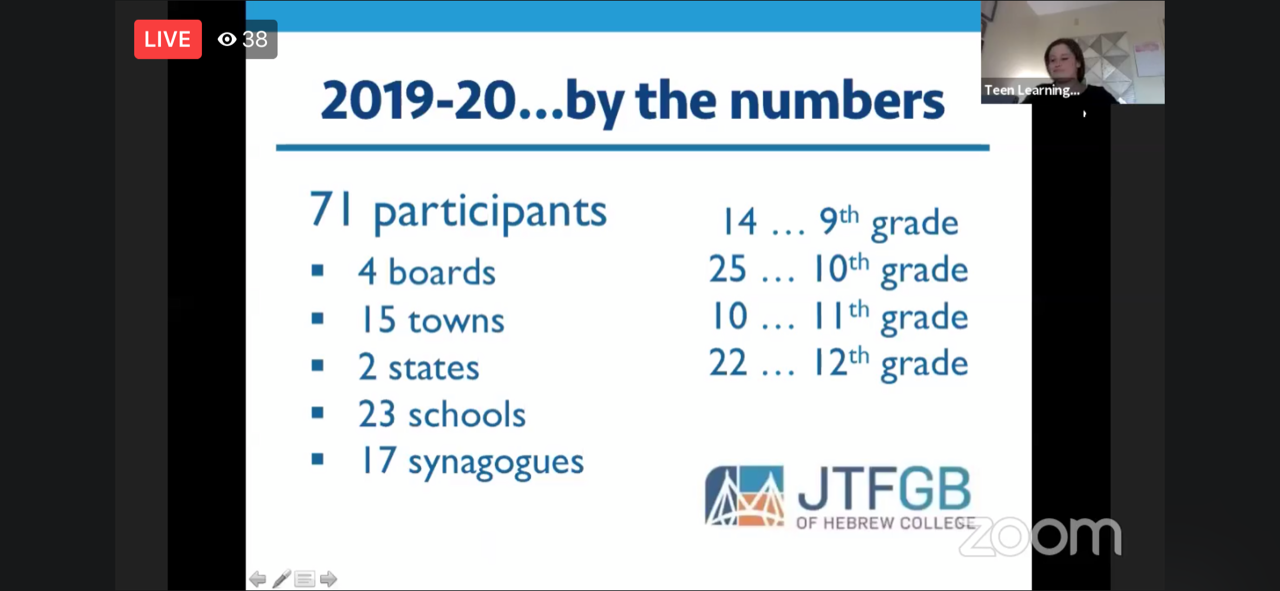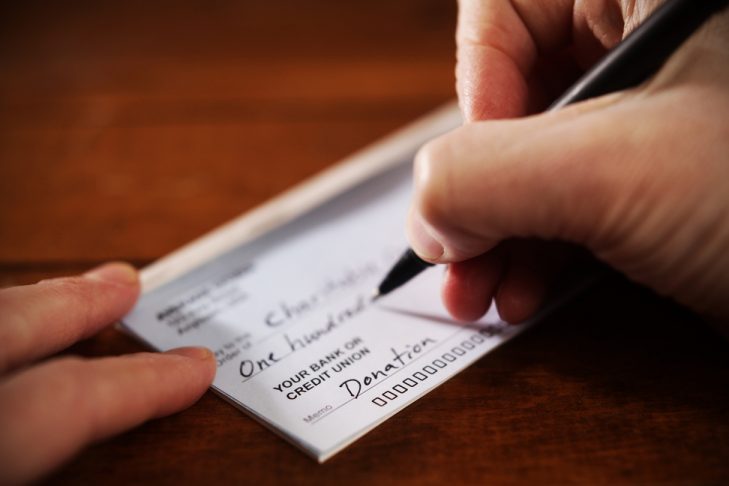The Jewish Teen Foundation of Greater Boston (JTFGB), a Hebrew College youth program that teaches local high school students about philanthropy, civic leadership and grant-making, awarded nearly $60,000 in grant funding on May 27 to eight organizations chosen by teen leaders that focus on education inequality, substance use disorder, environmental justice and gun violence.
JTFGB, which launched in 2015, asks students to choose a philanthropic mission, raise money for that effort and partner with non-profits, both Jewish and non-Jewish, to make a difference. Students learn how to build consensus, request and review grant proposals and solicit donations. And throughout the process, teens are introduced to Jewish texts and ideas, including values of compassion, community and tikkun olam (repairing the world), as well as to peers who have backgrounds and experiences that are different from their own.
In the past five years, students have raised more than $200,000 to various organizations that help fight sexual assault, mental health and substance abuse, among other issues. This year, they solicited gifts from more than 600 donors.
“This is an amazing achievement for our teens considering the current situation,” said Leah Goldstein, director of JTFGB. “Coming to consensus and making these big decisions is already challenging, but even more so over a computer screen. We are so proud of what our JTFGB students have learned and accomplished.”

“After a year of learning, research, site visits and spirited consensus-building guided by JTFGB director Leah Goldstein, our four student boards are excited to announce where they will be donating funds,” said Rabbi Laura Bellows, director of youth programs at Hebrew College. “The Jewish values-driven decision-making, collaboration and leadership cultivated in JTFGB is grounded in a culture of empathy, courage and thoughtful giving that we need now more than ever.”
Each year, the teens divide into several groups, or boards, and work together to pick an issue area, debating whether it will be local, national or global. Then they look for nonprofits that connect to that issue area, do site visits to or virtually with organizations and debate the merits of various grant recipients. After a specific fundraising kick-off event in January, they begin sending tailored solicitation emails and making pitches on the phone. The teens raise thousands of dollars each before choosing organizations to receive their grants and announcing their gifts.
“My experience with JTFGB these past three years has not only provided me with a wonderful community of motivated Jewish teens but has exposed me to so many important causes in the world,” said Sara Modiano, a senior at Newton South High School. “I got to connect with areas of need in my community and was given the tools to create change—tools that after I leave JTFGB will be with me for the rest of my life.”
“The tangible reward of giving grants to nonprofits is unmatched by any other program I’ve been a part of,” added Danny Richmond, a senior at Needham High School. “I am certain that the collaborative and fundraising skills I’ve developed through JTFGB will help me in the coming years.”
This year, one board chose to give grants to three organizations working on educational inequity: Education Matters (in Zimbabwe), Mother Caroline Academy and Education Center and Yemin Orde Youth Village (in Israel). The second board chose to give to two organizations focused on substance use disorder: Retorno (in Israel) and Victory Programs. The third chose two organizations focused on environmental justice: Environmental Integrity Project and Friends of the Earth. The fourth, focused on gun violence, gave its funds to Sandy Hook Promise.
Participants say the program taught them how to review a grant proposal, what to ask about during a site visit, how to find reputable nonprofit organizations, how to fundraise effectively and how to communicate, collaborate, convey their thoughts to others and come to a consensus.
“JTFGB has really added an extra aspect to my life,” said Danielle Frankel, a sophomore at Nobles. “I have been able to connect with other teens in the Greater Boston Jewish community on a meaningful level. I have become more aware of what values are really important to me and how I will always carry those, even outside of JTFGB. I am so grateful for the opportunity to be a member of this special program.”
“JTFGB has taught me so much about the world and who I want to be inside of it and for it,” added Simone Klein, a senior at Newton South High School. “I think that what I’ve learned about nonprofits, the power of giving, togetherness and professionalism will absolutely continue to inform my decisions and path after high school.”
JTFGB launched in 2015 as a Foundation Board Incubator program with the Jewish Teen Funders Network (JTFN), which works with educators and professionals around the country to create, connect and support Jewish teen philanthropy programs as forms of experiential education for Jewish teens. As an incubator, the program received four years of funding from Laura Lauder and The Maimonides Fund. The program is now doing its own fundraising as a self-sustaining Hebrew College program with the support of a matching grant from CJP.
This post has been contributed by a third party. The opinions, facts and any media content are presented solely by the author, and JewishBoston assumes no responsibility for them. Want to add your voice to the conversation? Publish your own post here. MORE


